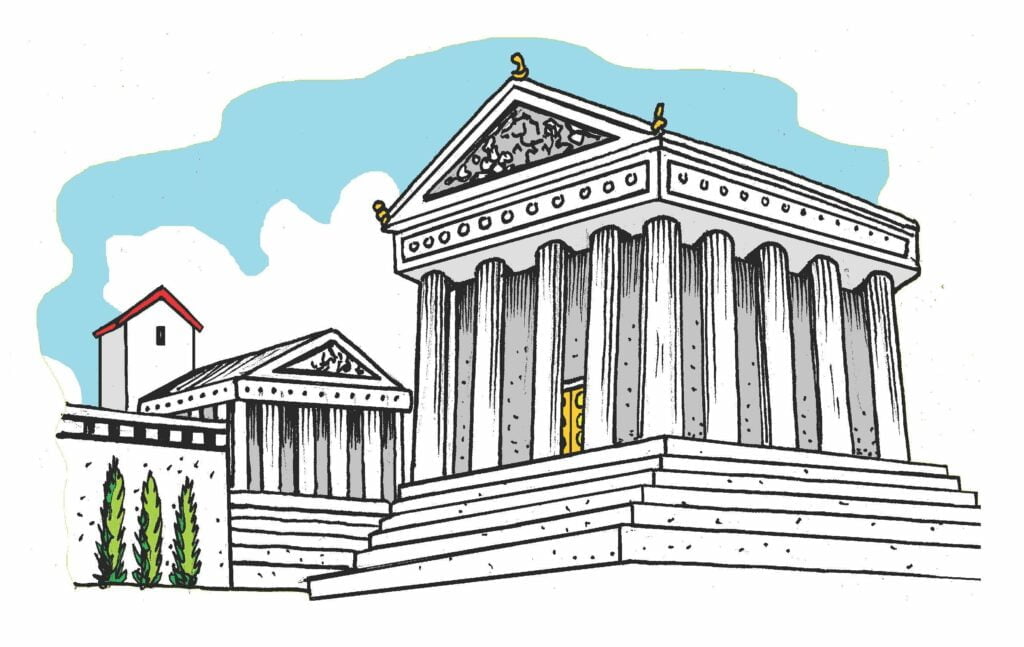
In 510 BC the Athenians overthrew their tyrant King Hippias, with the help of Cleomenes I, King of Sparta. Naturally, he tried to put his own man on the throne, and he chose Isagoras.
However, Cleisthenes, an Athenian lawyer, who was supported by the middle class and basically most of the population, opposed him. Isagoras asked Cleomenes I, to support him. Interestingly, Cleomenes had had an affair with Isagoras’ wife. Anyway, he bought 300 troops with him to help expel Cleisthenes.
Cleisthenes, along with the citizens of Athens, trapped them along with their troops on the Acropolis for two days. On day three a truce was agreed, allowing Cleomenes and Isagoras to escape, but they executed their supporters.
Cleisthenes then returned to Athens to become chief magistrate and started developing democracy. His plan was that 10,000 citizens should all exercise their power as members of the assembly. However, that proved impractical, so they appointed a council of 500 Athens citizens chosen by lot. Of course, everybody wasn’t included in the lottery. Only In order to vote, you had to be a citizen. However, not everyone who lived in Athens was a citizen. Yes theu had to be citizens but to be counted a citizen you had to be a man over 30 who completed military.
Then they realised corruption was occurring, and they came up with a novel idea of what to do with rotten council members, they developed “Ostracism”. They put a leave an urn outside the council chamber, then citizens could scratch a name onto a piece of pottery and put it in the urn. Then when the urn was full they counted the names and the biggest name was ostracised for 10 years. Isn’t that clever? It took us several thousand year to come to something similar!

It is explained in a song in the musical Athens – The Birth of Democracy. To perform it click on Athens – The Birth of Democracy where you will be able to read two pages of script, listen to two songs from the show and then download it so you can start rehearsing immediately
This eventually grew into the democracy we have today, in fact the founding fathers of the USA use it when they were writing the constitution, even more the Capital Building in Washington was inspired by the Greek democracy.
Isn’t history fun?
Questions for our students to ask about the birth of Democracy:
- What was the role of Solon in the establishment of democracy in Athens?
- Why were the wealthy traders unhappy with the implementation of democracy in Athens?
- Who was the tyrant ruler of Athens before the establishment of democracy, and how was he overthrown?
- How did Cleisthenes persuade the people of Athens to adopt democracy?
- Why did the Spartans support the return of Hippias to Athens?
- How did the wealthy merchants collaborate with the Spartans to restore the old dictatorship in Athens?
- What was the timeframe of democracy’s existence in Athens before the arrival of Alexander the Great?
- How did Alexander the Great’s conquest affect the democratic system in Athens?
- What were some of the notable figures and works that emerged during the democratic era in Athens?
- In what ways did democracy contribute to the flourishing of ideas and culture in Athens?
- What were some of the key principles of Athenian democracy?
- How did the spread of democracy impact other Greek city-states?
- What role did Sparta play in the rise and fall of democracy in Athens?
- How did the Romans affect the democratic traditions of the Greek city-states?
- What were some of the challenges faced by the democratic system in Athens during its existence?
- How did democracy in Athens differ from modern democratic systems?
- What were the major accomplishments of Athens during its democratic period?
- How did the democratic system of Athens influence later political philosophies and systems?
- What were some of the criticisms of democracy during its early years in Athens?
- Why is it important for contemporary societies to study and understand the origins of democracy in ancient Athens?
For more information on the start of Democracy in Greece please go to

